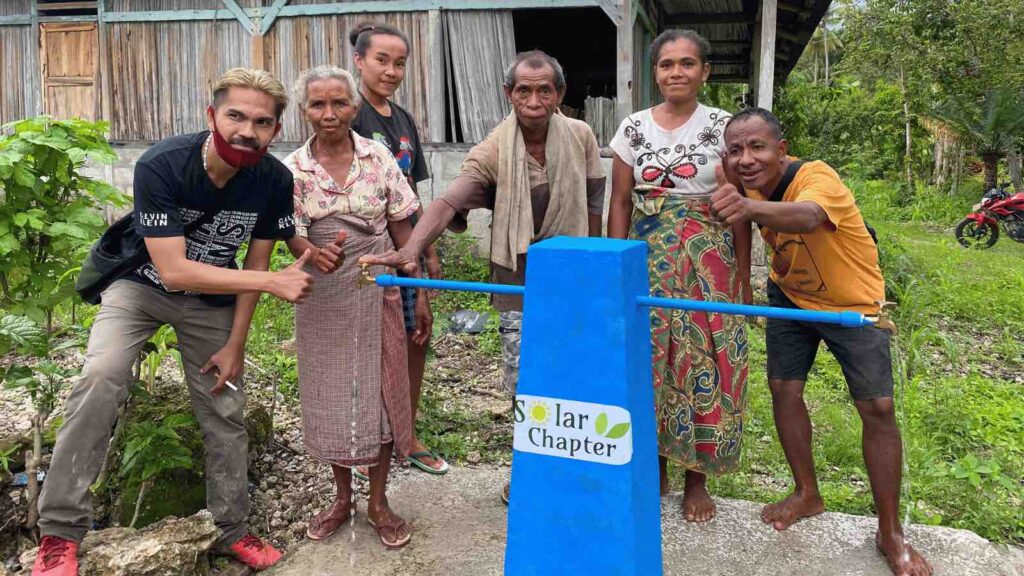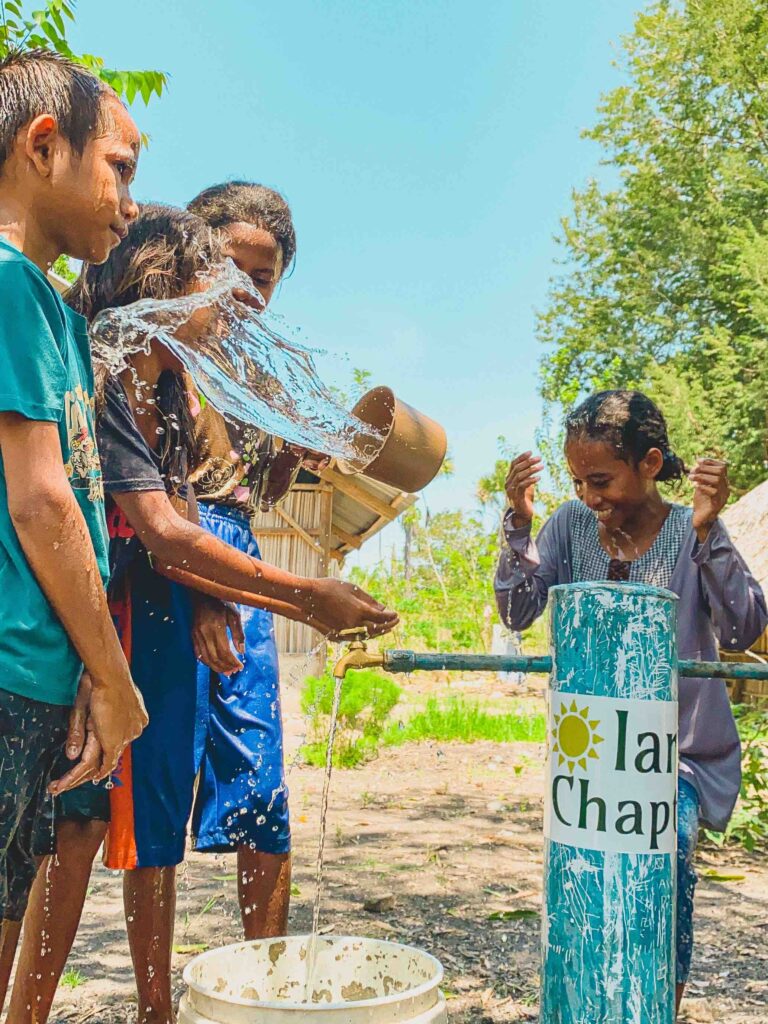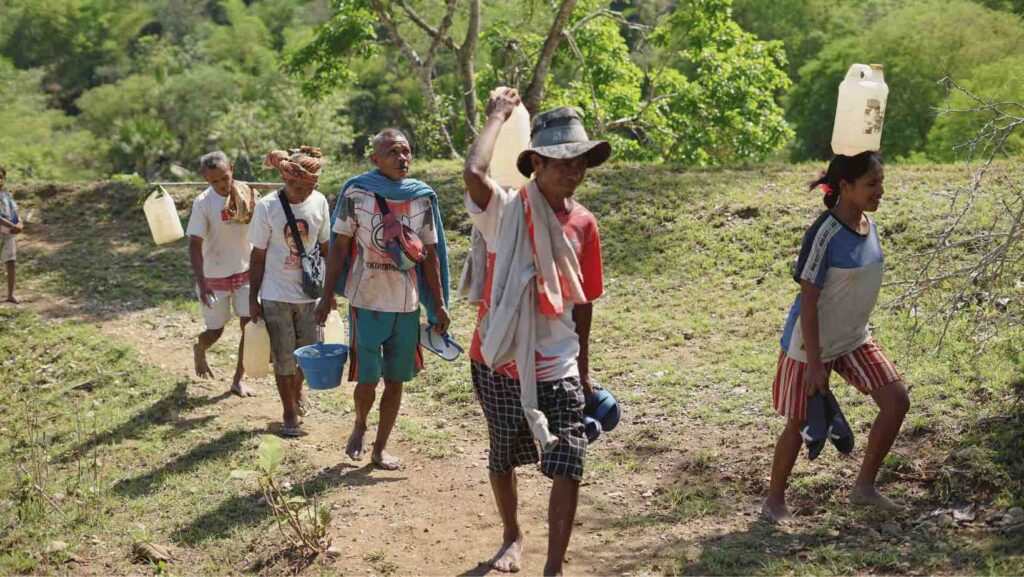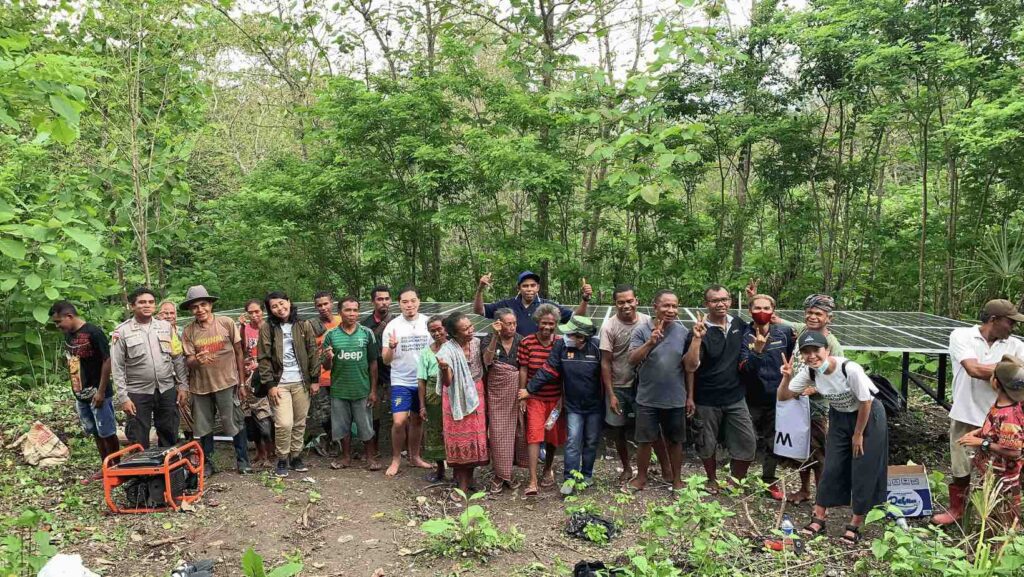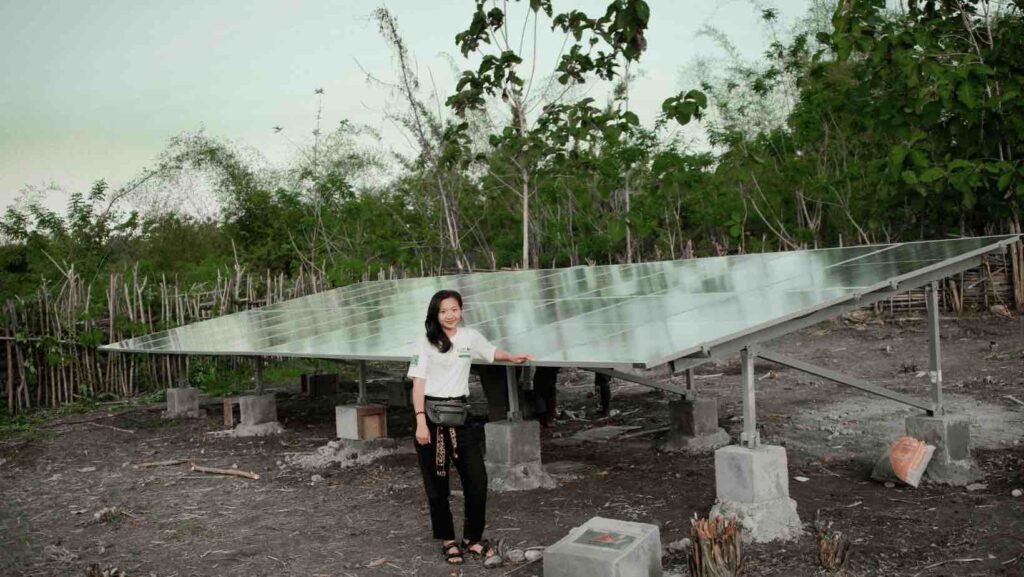In the remote communities of East Nusa Tenggara, Solar Chapter Indonesia has demonstrated the potential of clean energy solutions in addressing the challenges of climate justice.
In the remote and arid regions of East Nusa Tenggara, clean water is a scarce and valuable commodity. For decades, local communities have struggled to access clean water, with many having to rely on rainwater harvesting or walking several kilometers every day to collect water from nearby sources. These challenges have had far-reaching impacts, affecting education, health, and economic stability.
RELEVANT SUSTAINABLE GOALS
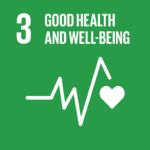
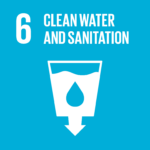
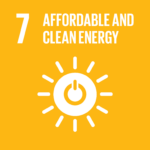

The Sunrise of a Sustainable Future: Tracing the Early Days of Solar Chapter Indonesia
In 2017, Solar Chapter emerged as a nonprofit with a noble mission: to uplift rural areas in Indonesia through holistic development. It all started with a simple yet powerful question from the founder, Mustika Wijaya. She had been visiting villages since childhood and was appalled to see children studying under the dim light of lanterns. This made her wonder why the cities had access to electricity 24/7 while the villages had none. Consequently, Mustika pursued electrical engineering with a focus on energy empowerment systems. Today, Solar Chapter is dedicated to providing sustainable solutions to rural communities and empowering them with the tools they need to thrive.
Providing electricity isn’t just lights people from the dark but also lights people’s lives
Mustika Wijaya, Founder & CEO of Solar Chapter Indonesia
During her college years, Mustika found herself searching for a passion that aligned with her desire to make a difference in rural Indonesia. She decided to focus on clean water and began researching nonprofits in the area. Unfortunately, she found that there was no available platform to support her efforts. Undeterred, Mustika took matters into her own hands and embarked on a journey from America to Kupang, followed by a 6-hour drive to the Malaka province. There, she witnessed the daily struggle of people who had to walk 3 hours just to access clean water. It was then that she had a moment of clarity – this issue could be addressed with solar power pump systems. With this in mind, Mustika founded Solar Chapter as a platform for young people to contribute to sustainable rural development in Indonesia. Today, Solar Chapter focuses on providing access to clean water and aims to impact more lives by 2028.
Overcoming the Challenges of Social Impact: Tips from Mustika Wijaya
Nonprofit organizations and social enterprises often face an uphill battle, with financial issues, resource scarcity, and insufficient support being just a few of the many challenges they encounter. However, Mustika has some useful tips to help overcome these hurdles. She suggests networking, applying for grants, and most importantly, connecting with other changemakers who share the same vision. Collaborating with other changemakers can provide a nonprofit or social enterprise with access to additional resources. Mustika herself has recently become an Obama Foundation Scholar and has been able to connect with like-minded individuals who offer valuable advice on building partnerships with other organizations to secure more resources.
Networking is a big part of starting your project and trying to make a change
Mustika Wijaya, Founder & CEO of Solar Chapter Indonesia
Nonprofit organizations often look to government support to help fund their initiatives. However, Mustika Wijaya, founder of Solar Chapter, recommends a different approach. Rather than automatically seeking government involvement, she suggests that organizations carefully assess the viability of their proposed solutions before considering such a partnership. Should an initiative prove to be viable, Wijaya recommends connecting with government officials and local champions who directly involved in the community, such as district or sub-district heads. This approach has proven successful for Solar Chapter, which has successfully collaborated with regent and religious leaders on several projects in East Nusa Tenggara.
Solar Chapter’s impact on East Nusa Tenggara communities is far-reaching. In one village alone, situated five kilometers from the nearest water source, the provision of clean water has significantly affected education, health, and economics. Prior to Solar Chapter’s intervention, children were often too exhausted to attend school due to the daily chore of collecting water. The lack of clean water also led to health issues like stunting and diarrhea. Moreover, over 93% of the local communities’ livelihoods depend on rainfed agriculture, making climate change a substantial threat to their well-being and economic stability. These communities are particularly susceptible to the effects of climate change, such as irregular rainfall patterns, droughts, and other extreme weather events. Our solar pump system helps address these challenges by providing a reliable and sustainable water source for daily needs and agricultural practices, even during periods of water scarcity. With Solar Chapter’s support, households receive approximately additional $18 a month, offering a much-needed boost to their income and food security.
For us, this may be hotter, but for them, they may not have enough food for several months ahead due to food shortages.
Mustika Wijaya, Founder & CEO of Solar Chapter Indonesia
Fostering Community Ownership for Future Sustainability of Solar Chapter
As Solar Chapter looks to the future, one of its biggest challenges is fostering a sense of ownership within the community. Long-term sustainability of the project depends on community members feeling invested and motivated to preserve the outcomes. However, this is no easy feat as local leadership changes can impact project support. A new leader may not consider the Solar Chapter project a priority and abandon it altogether. To mitigate this risk, Solar Chapter takes a proactive approach by building relationships with influential figures, such as religious leaders, who can help maintain and preserve the project even amidst leadership changes. With a focus on community engagement and collaboration, Solar Chapter remains steadfast in its commitment to empowering rural areas in Indonesia.
Advocating for climate justice and sustainable practices is not only the responsibility of nonprofit organizations and social enterprises but also individuals in the community. According to Mustika, spreading awareness can inspire NGOs and private companies to replicate sustainable solutions. Individuals can also contribute by donating to climate justice nonprofit organizations that focus on sustainable development. It is crucial to be mindful of our waste, such as reducing plastic usage and using tumblers for drinks, among other practices. Every small action counts towards a more sustainable future.
Solar Chapter has received funding from AVPN in collaboration with the Asian Development Bank (ADB) and Google to expand and monitor the capacity building for their clean water program. Mustika, the founder of Solar Chapter, believes that simply building the water system is not enough, and that large-scale monitoring and capacity building is required to cater to the specific needs of each village. In addition, the organization aims to promote gender inclusivity and equality in the water sector. This funding marks a significant milestone for Solar Chapter in their efforts to improve access to clean water in rural areas of Indonesia.
Mustika Wijaya: A Journey of Passion and Purpose
In 2017, a life-changing moment happened for Mustika when she installed the first water pump. As she was working on the project, she met a young girl who had to sacrifice her education to collect water for her younger sibling every day. The thought of how the lack of access to clean water could affect someone’s life struck her. But when Mustika returned to the village half a year later, she saw a public water tap installed right in front of the girl’s house. Seeing the girl playing with water near the reservoir, Mustika felt a sense of relief and joy knowing that she no longer had to walk miles to get water. It inspired Mustika to continue bringing access to clean water to more communities, and this heartwarming experience is one that she will never forget.
I think that’s what makes me get up every morning. I realized that there are a lot of children like her and the only solution is to get up and build the water pump system.
Mustika Wijaya, Founder & CEO of Solar Chapter Indonesia
Sustainability is a topic that Mustika is passionate about, and solar energy is her area of focus. She has a wealth of ideas, not limited to solar-powered pump systems, but also solar lighting and improving the distribution of solar appliances to help households save money. The Solar Chapter not only installs water pumps but also sets up water communities to operate and maintain them. However, Mustika noticed that men tend to dominate the management of these communities. To improve inclusivity, she aims to involve more women in maintaining clean water. Mustika’s interest also extends to agriculture since access to clean water can kickstart agricultural development. To all the young changemakers out there, this message is for you:
Commitment is more important than passion because passion can change. Keep going by staying committed to your communities and focusing on the problems you want to solve. Don’t be insecure about your young age; you have a head start to begin early.
Mustika Wijaya, Founder & CEO of Solar Chapter Indonesia


